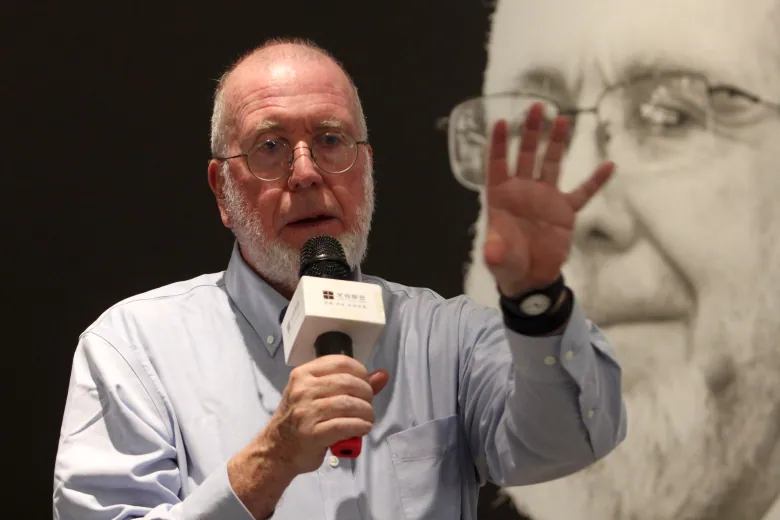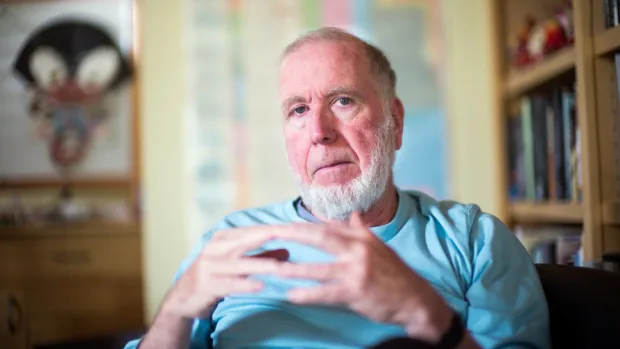Kevin Kelly believes optimism — and technology — can help us solve the world’s toughest problems
Tapestry47:07Kevin Kelly believes optimism — and technology — can solve the world's toughest problems
In a bold scenario published 25 years ago when Kevin Kelly was executive editor, the groundbreaking tech magazine Wired presented an optimistic outlook for the decades leading up to 2020.
Thanks to the swift development of increasingly powerful technologies, and as globalization led to more interconnected societies and economies, wrote authors Peter Leyden and Peter Schwartz, worldwide prosperity would flourish.
Climate change would be slowed by the new millennium's third decade, the scenario predicted, thanks to a rise in hybrid electric and hydrogen-powered motor vehicles. Fossil fuels, too, would be largely phased out.
Despite the challenges we face in 2022 — declining environment included — Kelly, an author, futurist and now senior maverick at Wired, says he has no doubts about the cover story that declared we the world was in the midst of The Long Boom.
"By every measure of our own lives, we are doing better," he told Tapestry host Mary Hynes. "The environment doesn't look better, but we also have an ability to fix that before it gets worse.
"The thing about optimism isn't that our problems are smaller than we thought. It's just that our capacity to fix things is much greater than we thought."
Kelly is unabashed in his pursuit for optimism. In a 2021 TED Talk, he argued that the scale of apparently intractable issues, like global warming and poverty, are all the more reason for it.
"Because what we know is that in the past, every great and difficult thing that has been accomplished, every breakthrough, has in fact required a very strong sense of optimism that it was possible," he said on the stage.
Innovations in technology, Kelly argues, increase the choices, freedoms and possibilities available to us. He likens technology to the natural world — both have their origin at the Big Bang, he says — adding that just as evolution contributes to an ecosystem, new technologies create even newer technologies.
Perhaps notably, that same 25-year-old Wired magazine included a list of things that could potentially spoil its predicted optimistic future — including the possibility of a nationalist Russia threatening Europe and an "uncontrollable plague" — which now seem prescient.
Hype can be valuable
Technology evangelists have been criticized for hyping — sometimes aggressively, even arrogantly — the benefits of new products.
There's no shortage of boosters proclaiming the life-changing potential of artificial intelligence, community-building opportunities in the metaverse, or the ability for cryptocurrency to reshape entire economies.
WATCH | Kevin Kelly on the value of optimism:
The founders of social media platforms have long proclaimed the value of connecting the world online. At the same time, those social networks have been criticized for harming democracy and perpetuating harm against marginalized communities.
But Kelly says that hype is a "small tax to pay" for potential discoveries that can improve the world.
"Most breakthroughs were ridiculous the day before they happened. In fact, if they weren't considered ridiculous, they weren't really a breakthrough," said Kelly, pointing to developments such as antibiotics and telecommunications.
Wired, for its part, was guilty of perpetuating that same "exuberance and hype," Kelly said. He doesn't see it as a problem.
"[Hype] is incomplete truth that's exaggerated, but the exaggeration serves as a function," he said.
"You want to be aware of hype, and you should call it what it is, but I don't think that it necessarily is always totally inappropriate."
Bits of advice
On his 70th birthday in April, Kelly shared 103 "bits" of wisdom on his blog, The Technium (a title referring to the writer's idea that technology is the seventh kingdom of life). It was his third post in a series of birthday-inspired lists of unsolicited advice he wished he knew sooner.
Each insight underlines his optimistic worldview.
One encourages readers to hone their listening skills. "While listening to someone you love, keep asking them 'Is there more?' until there is no more," wrote Kelly.

Listening, he says, is a superpower, especially in relationships.
"We humans kind of need encouragement to … do a little bit more work in getting to the bottom of things," he told Hynes.
Doing so can better help us understand others, particularly their hidden parts. In a separate bit of advice, Kelly recommends digging deep to see the "hidden" 98 per cent in others — and ourselves.
Therapy can be one way toward that level of self enlightenment, he says. Mindfulness practices, like meditation and journaling, can also improve self awareness.
The "quantified self" movement, which Kelly has followed, encourages people to track different data points — from blood pressure to mood — to better understand themselves.
In approaching how we learn about others in the same way, Kelly suggests we can become more empathetic.
"Simply knowing that there may be other things going on and giving them that kind of slack … we may not see it, but we can also say, 'Well, there's something happening there,'" he said.








Gloss